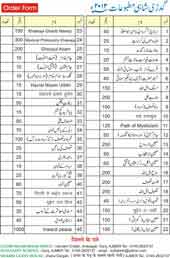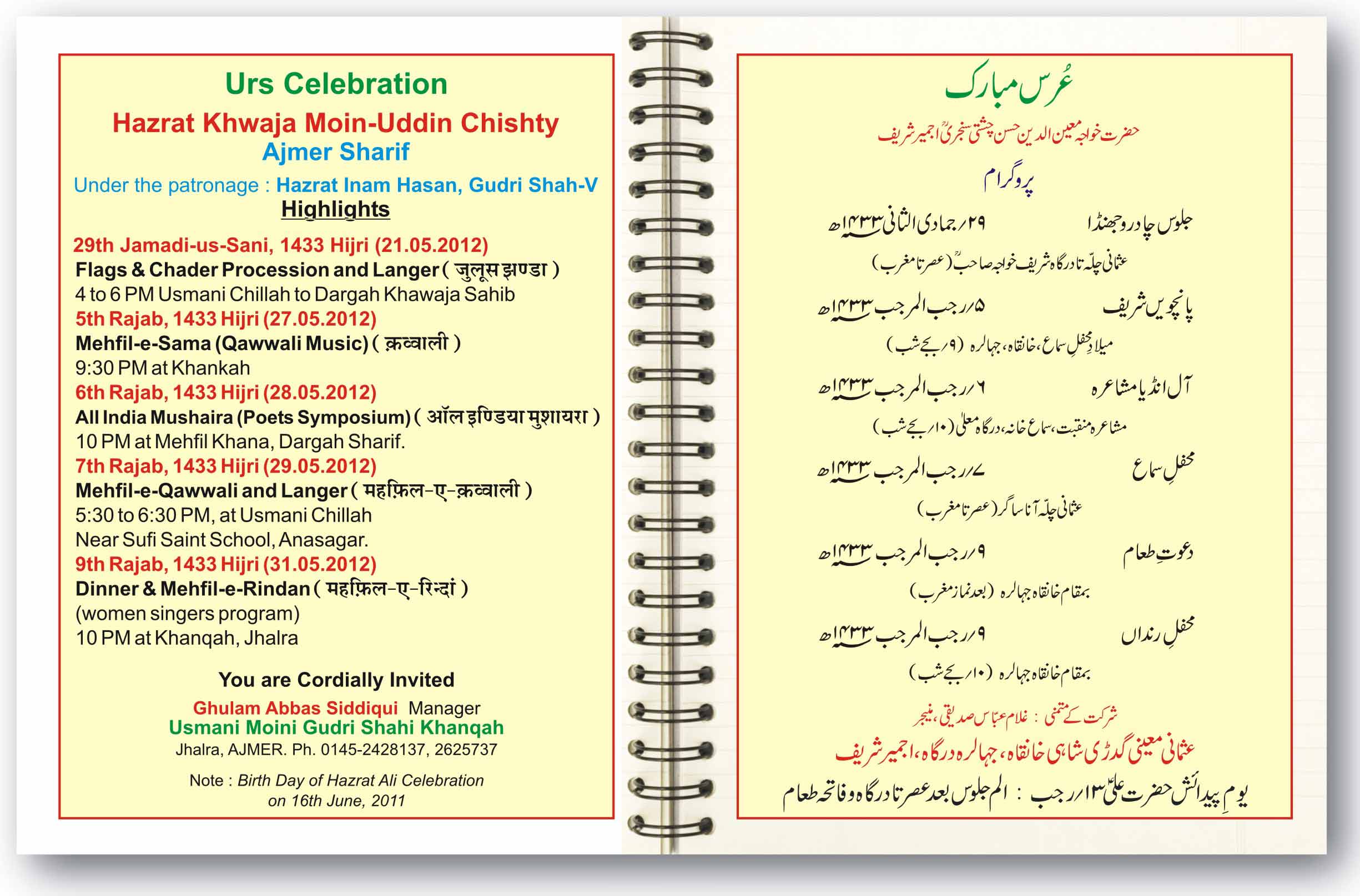
|
Written By : Hazrat Dr. Zahurul Hassan Sharib Gudri Shah Baba God is Love or Love is God ABOUT THE BOOK The book as its title suggests is a veritable mine of mysticism. The book deals with the life and sayings of the Holy Prophet Mohammed and of Hazrat Ali who is the fountainhead of Islamic Mysticism. It deals also with the life and sayings of twenty-two saints belonging as they do to the Chishti Order of the Sufis. INTRODUCTION This little book is unique of its kind. The biographies of the muslim saints who stand as the most illustrious luminaries in the firmament of spiritualism have not so far been written in English nay even in the vernaculars the materials are but very meagre. The part the great saints have played in the spiritual evolution of mankind is unquestionably very great. The true notion of the unity of God in India as in other parts of the world was inculcated by them. The materialistic tendencies of the age may to a great extent be considered responsible for this neglect shown towards the benefactors of mankind. The truth contained in the saying, "Man does not live by bread alone" is as strong now as it was nineteen hundred years ago. People do still find solace for their distracted minds in the lives and sayings of the great saints. The sayings contained in the book are universal truths that do not change with the time. For a man possessed of a meditative turn of mind they are an inexhaustible store of spiritual food. Some of the sayings tersely expound the great pantheistic doctrine of Sufi-ism. The power of music on human passions is really great as shown in the forcible words of some of the sayings. It touches upon the most hidden springs of human soul. Harmony in sound makes him realize the harmony in the universe and that his "EGO" is a mere manifestation of one great being that pervades it. Great pains are taken in the collection of the sayings. Thanks are due to Mirza Abdul Majid, B. A. L. T., Headmaster, Hewett Muslim High School, Moradabad, for his carefully revising the book. In the end, I hope that the book will meet with the public approbation, which will constitute a true test of its merits. Dated 17th May 1929 Nurul Hasan (Rais, Hony. Magistrate, Moradabad.) PREFACE The book was first published bearing, the title, "Biographies and Sayings of the Holy Saints". The second edition of the book was long overdue. Now, the second edition of the book is being taken out with a slightly different title -namely “Biographies and Sayings of Chishti Saints”. There are no marked changes in the book except that brief chapters on Hazrat Khawaja Qutub Uddin Bakhtiar Kaki, Hazrat Baba Farid Uddin Ganj-E-Shaker, Hazrat Khawaja Nizam Uddin Aulia and on Hazrat Naseer Uddin Chiragh Delhi have been, added. Moreover, a few lines have been added in the chapter on Hazrat Nawab Gudri Shah Baba, thus bringing the book up-to-date. It is proposed to take out books in this series, relating to saints of different Sufi Orders. I may say, that Inam Hasan M. A. seems much enthusiastic about the publication of this and other books in this series. "Sharib House" Jhalra Ajmer, India Zahurul Hassan Sharib March, 1981 Hazrat Mohammad Mustafa, the prophet of God. His name is Mohammed Son of Abdullah Son of Abdul Muttalib Son of Hashim. His mother's name was Amena. He was born on Monday on the 12th of Rabiul-Awal early in the morning. When he was forty years old he received the message of God on Monday on the 8th of Rabiul-Awal. He left Mecca for Medina on Monday on the 27th of Safar. He stayed for ten years in Medina. He breathed his last on Monday on the 12th of Rabiul-Awal in the eleventh year of Hijrat. (Mohammadan Era is counted from the day when the Prophet left Medina). His mausoleum is at Medina. It is considered to be the most sacred place for Muslims. Sayings of the Prophet 1. Live together like brethren but deal like strangers. 2. The best man is he, who is the first to salute. 3. Know thyself to know God. 4. I did not know God so well as it was my duty to know Him. 5. Oppress not, suffer not. 6. Be kind to women for they depend upon you. 7. Whatever is entrusted to you return it honestly to the owner. 8. Fortunate is he, who culls wisdom by others' actions. 9. Love the lover of God. Love God sincerely and never cease praying to Him. 10. Worship God alone and do not make His rival. 11. Love one another for God's sake. 12. Breach of promise is disliked by God. 13. Noblest amongst you is he who is the most pious. 14. Propagate Islam and feed the hungry. 15. There is but one God. Syedna Ali Murtaza His name is Ali. His popular titles are Abul Hasan, Abu Turab, Mushkil Kusha, Sher-e-khuda and Murtaza etc. He was the son of Abu Talib son of Hazrat Abdul Muttallib. His mother's name is Fatimah, daughter of Asad son of Hashim. He was the first believer in MOHAMMED, the Arabian Prophet. He became caliph in 35 or 36 Hijira. He was assassinated at the age of sixty-five after he had propagated the religion. His mausoleum is at Najaf-e-Ashraf. Sayings Khawaja Hasan Basri His name is Hasan. His popular titles are Abu Said and Abu Mohammed. His father's and mother's names are Abul Hasan and Khera respectively. He was born at holy Medina. He met one hundred thirty-three persons who had seen the Prophet. Hazrat Ali invested him with the robes of Khilafat as his spiritual successor. He breathed his last at the old age of eighty-nine in the month of Rajab 111 Hijira. He was buried at Basra. Sayings Hazrat Shaikh Abdul Wahid Son of Zaid His name is Abdul Wahid and his father's name is Zaid. Khawaja Hasan Basri invested him with the robes of Khilafat as his spiritual successor . He was a very pious man and spent some forty years in the purification of his soul. He bade farewell to this world on the 27th of the month of Safar in 167 or 177 Hijira. He was buried at Basra. Sayings Khawaja Fuzail Son of Ayaz He is known as Abu Ali Fuzail and Abu Faiz Fuzail also. He was born at Samarkhand and was brought up in Khorasan. He was nominated as the spiritual successor by Abdul Wahid. He was well versed in the knowledge of Tafseer (Commentary) and Hadees (muslim Traditions). He passed away from this world on the 3rd of Rabiul- Awal in 187 Hijira. His tomb is at Mecca, near Khadejetul Kubra's grave. Sayings Khawaja Sultan Ibraheem Son of Adham of Balakh His name is Ibraheem. He is also known as Abu Ishaq. His ancestors are Adham, Suleiman, Manssor, Nasir of Balakh Faruqi. He belongs to the royal dynasty of Balaq. He gave up the throne and became a Dervish. He went to sacred Mecca. He was the spiritual successor of Fuzail son of Ayaz. He breathed his last in 261 Hijira. He was buried near Hazrat LOOT in Syria. People hold different opinions about the date of his death and the place where he was buried. Sayings Hazrat Khawaja Sadeeduddin Khadeefa Marashee He was pious in life, an author of many books and a great religious reformer. He was the spiritual successor of Hazrat Ibraheem son of Adham of Balakh. He breathed his last on the 24th of Shawal in 256 Hijira. He was buried at Basra. Sayings Hazrat Khawaja Abee Hubera Basree He is the spiritual successor of Khawaja Sadeeduddin. He lived on his honest earnings. He never accepted any gifts or presents from the rich. He passed away from this world at the age of one hundred and twenty or one hundred and thirty on the 7th or 8th of Shawal in 287 Hijira. He was buried at Basra. Sayings Hazrat Shaikh Mumshad Uloo Denoori He was the successor of Khawaja Aminuddin. He was famous for his piety and sanctity. Throughout his life he took nothing in the daytime, even when a baby he would not drink his mother's milk in the day. He was born in Denoor near Baghdad. He was brought up in Baghdad. He breathed his last on the 14th of Moharram in 299 Hijira. His burial place is not known. It is probable that he was buried at Baghdad. Sayings Hazrat Khawaja Abu Ishaq Shami Chishti His name is Abu Ishaq and his native place is Syria but he lived in Chisht. He is known as Chishti and he is the founder of the Chishti dynasty. At first Hazrat Abu Ishaq came into contact with Hazrat Khawaja Mumshad Uloo Denoori the latter asked the name of the former. He answered that his name was Abu Ishaq Shami. Hazrat Mumshad Uloo Denoori told him that he would be called by the name of Abu Ishaq Chishti. Having nominated him as his spiritual successor he sent him to Chisht a town in Khorasan. From that day his followers are called, "CHISHTIES". He passed away from this world on the 14th of Rabius-Sani in 343 Hijira. Sayings Hazrat Shaikh Abu Ahmad Chishti He is the spiritual successor of Khawaja Abu Ishaq Chishti. He did not sleep for thirty years and was absorbed in meditation. He breathed his last on the 3rd of Jamadeus-Sani at the age of ninety-five in 356 Hijira. He was buried at Chisht. Sayings Hazrat Shaikh Abu Mohammad Chishti He was invested with the robes of spiritual Khilafat as his successor by his father, Khawaja Abu Ahmad Chishti. He passed away from this word on the 4th of Rabi-us-Sani at the age of seventy in 409 Hijira. Sayings Hazrat Khawaja Abu Yusuf Chishti He is a true Syed. He was invested with the robes of spiritual Khilafat as his successor by his maternal uncle, Khawaja Abu Mohammad Chishti. After the death of Khawaja Abu Mohammad Chishti, he became his successor. He nominated his eldest son as his successor. He breathed his last on the 3rd of Rajab at the age of eighty-four in 459 Hijira. He was buried at Chisht. Sayings Hazrat Khawaja Moudood Chishti He had learnt the Quran by heart and could recite it very melodiously at the age of seven. Afterwards he learnt other things. When he was only twenty-six years old his father's life came to an end. According to the will of his father he became his successor. He was the first to salute others and used to stand out of respect to others. He is famous for his hospitality. He was kind to his servants. He bade farewell to this world in the month of Rajab at the age of ninety-seven in 533 Hijira. He was buried at Chisht. Sayings Hazrat Shaikh Hajee Shareef Zindanee He led a life of strict seclusion for forty years and hated society. He used to live on the leaves of trees. He passed away from this world on the 10th of Rajab at the age of one hundred and twenty in 612 Hijira. He was buried at Zindana. Sayings Hazrat Khawaja Usman Harooni He was the true successor of Haji Shareef Zindani and is the spiritual guide of Hazrat Khawaja Moin Uddin Chishti Sanjree of Ajmer. He was born at Haroon. He was a great traveller. He passed the last days of his life in Mecca and there breathed his last on the 5th of Shawal in 603 Hijira and was buried there. Sayings Hazrat Khawaja Moin Uddin Hasan of Sanjar Chishti His father's name was Khawaja Syed Ghiyasuddin of Sanjar. After the death of his father, Gharib Nawaz distributed the inherited property among the poor and devoted himself to God. He learnt the Quran in Bukhar and Samarqand. Afterwards he became a follower of Khawaja Usman of Haroon. Just after his becoming the spiritual successor of Khawaja Usman Harooni he came to India to propagate truth. His paternal home was at Sanjar. He was born in Sanjar, but was brought up in Khorasan; and came to AJMER (India) where he lived. He breathed his last on the 6th of Rajab at the, age of one hundred and two, in 632 Hijira. He was buried at Ajmer. Thousands of people visit his Dargah annually to receive blessings. He is known as King of India, Gharib Nawaz, Khawaja Sahab and Rahmat-e-Hind etc. Sayings Hazrat Khawaja Qutub Uddin Bakhtiar Kaki He is the son of Syed Moosa; He was born at Osh in 569 A.D. His father died, when he was still an infant. He is a spiritual disciple, premier Caliph and spiritual successor of Hazrat Khawaja Moin Uddin Hasan Chishti, better known as Khawaja Gharib Nawaz. He had two sons. He was an author and a poet too. He died, when he was participating in a music concert on the 14th of Rabiul-Awwal in 633 A.D. His tomb is situated in Mehrauli, New Delhi. Sayings Hazrat Baba Farid-Uddin Masud, Ganj-e-Shakar He is the son of Jamal Uddin Sulaiman. He was born in 569 A.H. He is invoked by his title – "Ganj-e-Shakar". He is the spiritual successor of Hazrat Khawaja Qutub Uddin Bakhtiar Kaki. He had four wives, five sons and three daughters. He breathed his last on the 5th of Moharram in 670 A.H. His tomb is situated in Pak Pattan (West Punjab, Pakistan). Sayings Hazrat Khawaja Nizam Uddin Aulia He is the son of Khawaja Syed Ahmed. He was born on the 27th of Safar in 636 A.H. He is the spiritual successor of Hazrat Baba Farid Uddin Masud, Ganj-e-Shakar. He is invoked by his title "Mehboob-E-Ilahi" which means "Beloved of God". He died on the 18th of Rabi-Us Sani in 725 A.H. His tomb is situated in a locality, called Nizam Uddin (New Delhi). Sayings Hazrat Khawaja Naseer Uddin Chiragh Delhi He is the son of Shaikh Yahya. He is the spiritual successor of Hazrat Khawaja Nizam Uddin Aulia. He is known as "Chiragh of Delhi", "Lamp of Delhi". He breathed his last on the 18th of Ramzan in 757 A.H. He lies buried in Delhi. Sayings Hazrat Syed Malik Mohammad Alam Moeeni Khanjar Walay better known As Saeen Gudri Shah Baba His birth place is Kubke (Punjab) India, which is also called Khabaki in Shahpura district (Punjab). His father's name was Malik Shair Mohammed Khan who had acquired considerable estate during the sikh rule. As he grew up his father breathed his last and he went into the jungles. He lived in the company of Moazzam Shah Sahab who was buried at Sialkot. He often visited many sacred places on foot. Afterwards he used to live in Ajmer. He was a true Syed. He passed away from this world on the 10th Ramzan in 1327 Hijira. It is said that he died at the age of one hundred and twenty five years. He was buried at Ajmer near the Chillah of Gharib Nawaz (a subterranean cave and the first abode of Gharib Nawaz on his arrival at Ajmer, it is considered to be a very holy place by all people. Thousands of people come from all parts of India to visit this cave). Sayings Hazrat Abdur Raheem Shah Sahab Moeeni better known as Qazi Gudree Shah Baba He is the spiritual successor of Hazrat Saeen Gudri Shah Baba. His family members were the old residents of the district Bijnor (U.P. India). His father's name was Shaikh Ali Baksh. He lived in district Kashipur. He was brought up under the guardianship of his father in Meranpura. When he was about twenty-seven years old he came to Ajmer all alone. For a long time he stayed at different places. In Ajmer he felt the pangs of penury. He went to Saeen Ji to serve. He served Saeen Ji for about twenty or twenty-five years. After the death of Saeen Ji he devoted himself of (or to) philantropic services for sixteen or seventeen years. At last he expired on the 5th of Shawal at the age of sixty-four in 1344 Hijira. He was buried at Ajmer in the Chillah of Gharib Nawaz. Sayings Mohammad Khadim Hasan Moeeni Gudri Shahi better known as Nawab Sahab Or Nawab Sahib Baba He is the spiritual successor of Qazi Gudri Shah Baba. He was born at Moradabad in 1894. His father's name is Khan Sahib Munshi Mazhar Hnsan. He was a wealthy man of Moradabad. When he was only fifteen years old his father breathed his last in the year 1909. He received his education in the Government High School, Moradabad, and passed his Entrance Examination in 1914. After this he joined the M.C. College Allahabad, but circumstances did not permit him to continue his studies further. He was married to the daughter of Nawab Khawaja Mohammad Khan Sahib Jagirdar of Dholpur State. He used to come with his father-in-law to Ajmer on the occasion of the Urs of Khawaja Gharib Nawaz. Qazi Gudri Shah Baba was a friend of Nawab Khawaja Qazi Sahib. As the years rolled on, the relations between Qazi Sahib and him grew closer. He paid occasional visits to Qazi Sahib, at last Qazi Sahib bade farewell to this world. He then settled in Ajmer. He fell ill in September, 1970. He breathed his last on 29th of November, 1970 at Agra. His remains were brought to Ajmer and buried at Usmani Chilla. He is better known by his title of Nawab Gudri Shah Baba. He has written many books "Moin Ul Arwah" is his masterpiece. He was an inspired poet. His poetic nickname was "Khadim". Sayings |


















































